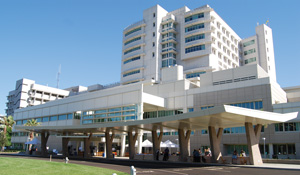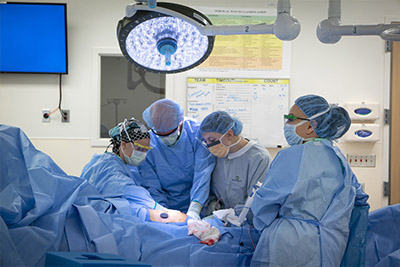Surgical critical care fellowship

Surgical Critical Care
at UC Davis
Surgical critical care fellowship accredited by ACGME
The University of California, Davis Department of Surgery offers advanced training in surgical critical care in a fellowship accredited by the American Committee for Graduate Medical Education (ACGME) and the Residency Review Committee for Surgery. The fellowship is part of the Division of Trauma, Acute Care Surgery and Surgical Critical Care that is under the leadership of Dr. Rachael Callcut. The fellowship is under the direction of Dr. Christine S. Cocanour. Three one-year positions are offered each year. Those with a desire for additional training in acute care surgery or with interests in basic science or clinical research may elect to continue for an additional year if approved by program leadership. Fellows completing the one-year fellowship qualify to sit for the American Board of Surgery's Certificate of Added Qualifications in Surgical Critical Care.
There is also a one-year ACGME accredited Burn Surgical Critical Care fellowship that qualifies the fellow to sit for the American Board of Surgery's Certificate of Added Qualifications in Surgical Critical Care. Additional information regarding the Burn Surgical Critical Care fellowship is found at https://health.ucdavis.edu/burncenter/education/burn_fellowship.html.
UC Davis Medical Center, Department of Surgery
UC Davis Medical Center serves a 65,000-square-mile area that includes 33 counties and 6 million residents across Northern and Central California. The 646-bed acute-care teaching hospital admits approximately 30,000 patients per year and handles more than 800,000 visits. The medical center’s emergency room sees more than 200 patients per day on average. The UC Davis Medical Center is the sole Level I trauma center and has the only Burn Unit in the inland Northern California area.
The medical center has critical care units dedicated to neonatology, pediatrics, medicine, cardiology, burns, neurocritical care, vascular surgery, cardiothoracic surgery, surgery and trauma. There are over 100 intensive care unit beds, which is a reflection of the medical center's role as a major regional referral center for complex critical care, trauma, and burns. The Department of Surgery provides comprehensive care for complex surgical problems in gastrointestinal, vascular, oncologic, transplantation, cardiac, pediatric and endocrine surgery. The trauma service admits over 4,000 trauma patients per year with about 15% of patients being victims of penetrating trauma.
Fellowship rotations
The Department of Surgery strongly embraces surgeons being involved with all aspects of critical care management and this philosophy is an underlying principle of the fellowship. Rotations are designed to provide exposure to a wide range of pathology and critically ill surgical patients. Most of the year is spent on the surgical critical care service which cares for trauma, emergency general surgery, transplant, vascular, surgical oncology, gynecology-oncology and orthopedic surgery patients. In addition there are rotations on specialty intensive care units including the trauma service, the burn unit, the neurocritical care unit, the cardiovascular intensive care unit, and the medical intensive care unit.
Fellows work with residents from Surgery, Emergency Medicine and other surgical specialties. They are expected to participate in medical student and resident teaching throughout the year. There are also several didactic conferences focused on the education of UC Davis critical care fellows that are mandatory for the surgical critical care fellow.
Operative experience is valuable in the training of the Surgical Critical Care fellow. Fellows take a limited amount of trauma and emergency general surgery call throughout the year; where, as they gain experience, they are given the opportunity to work as junior attendings with experienced faculty present as needed.
Interested fellows are encouraged to participate in both basic science and clinical research. The Department of Surgery operates laboratory facilities at both the Sacramento and Davis campuses. Complete operating room facilities are available for research endeavors. The research facility at UC Davis Medical Center opened in 1993 and has the capability for cell culture and sophisticated biochemical and immunologic assays as well as large animal facilities including primate studies. Collaborative efforts with basic scientists both at the Sacramento and Davis campuses are possible. The large number of critically ill and injured patients offers unique clinical research opportunities.
Why Train at UC Davis Health?
Sacramento is the capital city of California. The metropolitan area has a population of about 2 million and the referral area represents a population of approximately 6 million. Located at the confluence of the Sacramento and American Rivers, the city and surrounding area offer a variety of recreational opportunities. The Sierra Nevada Mountains and Lake Tahoe are a two hour drive to the east and afford excellent downhill and cross-country skiing. The San Francisco Bay area is a 90 minute drive to the southwest, and the wine producing areas of the Napa and Sonoma valleys are within an hour's drive.
The main UC Davis campus is located in the town of Davis, approximately 15 miles to the west of Sacramento. The UC Davis Medical Center is in Sacramento.
Winters in the Sacramento area are relatively mild. Temperatures tend to be in the 40's and 50's and there is a moderate amount of rainfall. Summers are hot with minimal humidity and a cool delta breeze in the evenings. Spring and Fall are temperate and comfortable.
Housing and apartment rental costs are among the most reasonable in California and affordable housing in proximity to the Medical Center is relatively easy to find.
Salary compensation is based on the level of postgraduate training. Paid sick leave, professional liability insurance, and four weeks of paid vacation per year are provided. For more information on compensation and benefits please visit our School of Medicine dedicated resident/fellow human resources page: https://hr.ucdavis.edu/employees/ucdh-resident


 At UC Davis Health Department of Surgery, we’re known not only for excellence in training the next generation of surgeons, but for cultivating collaborative relationships that extend beyond the operating room. We stand strong behind our commitment to fostering a welcoming and supportive culture of equity, inclusion and diversity for the members of our faculty, trainees, team members and most importantly, our patients.
At UC Davis Health Department of Surgery, we’re known not only for excellence in training the next generation of surgeons, but for cultivating collaborative relationships that extend beyond the operating room. We stand strong behind our commitment to fostering a welcoming and supportive culture of equity, inclusion and diversity for the members of our faculty, trainees, team members and most importantly, our patients.